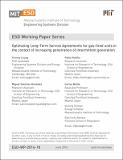Optimizing Long-Term Service Agreements for gas-fired units in the context of increasing penetration of intermittent generation
Author(s)
Leung, Tommy; Sanchez-Gonzalez, Miguel; Rodilla, Pablo; Batlle Lopez, Carlos
Downloadesd-wp-2014-18.pdf (501.2Kb)
Metadata
Show full item recordAbstract
As power systems increasingly rely on gas-fired power plants (GFPP), and as thermal cycling requirements increase due to larger penetrations of intermittent generation, the long-term service agreements (LTSAs) that define the conditions and costs for GFPP maintenance are exerting more economic influence over a power system’s short-term operations.
In a previous paper, the authors proposed a unit commitment formulation that explicitly represents LTSAs and showed that these operations and maintenance (O&M) contracts substantially impact the cost of economic dispatch when GFPPs are forced to intensively cycle. The authors also showed that properly modeling these contracts can substantially alter a power system’s short term optimal scheduling.
Traditional LTSAs were designed assuming that (especially) combined cycle gas turbines would operate in a base-loaded regime. In new operating regimes characterized by heavy cycling, GFPPs with traditional LTSAs can incur excessive cycling costs. It may be possible for owners of these GFPPs to renegotiate their existing LTSAs for more flexible conditions that will allow their GFPPs to cycle at lower costs, even if this renegotiation requires the owner to pay an upfront expense.
In this paper, we propose a formulation aimed at supporting the process of optimizing LTSAs contracts for a portfolio of GFPPs.
Date issued
2014-06Publisher
Massachusetts Institute of Technology. Engineering Systems Division
Series/Report no.
ESD Working Papers;ESD-WP-2014-18